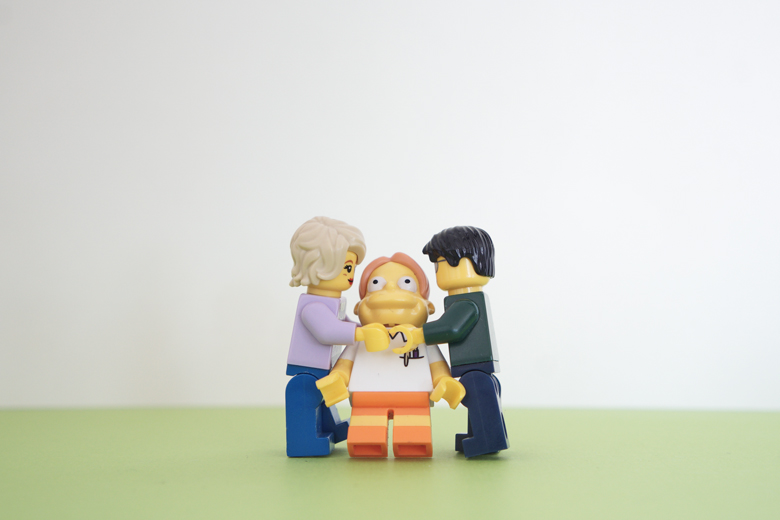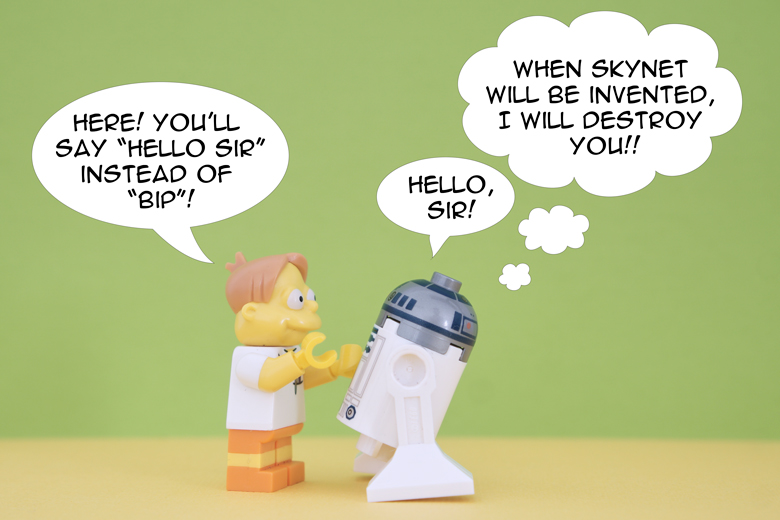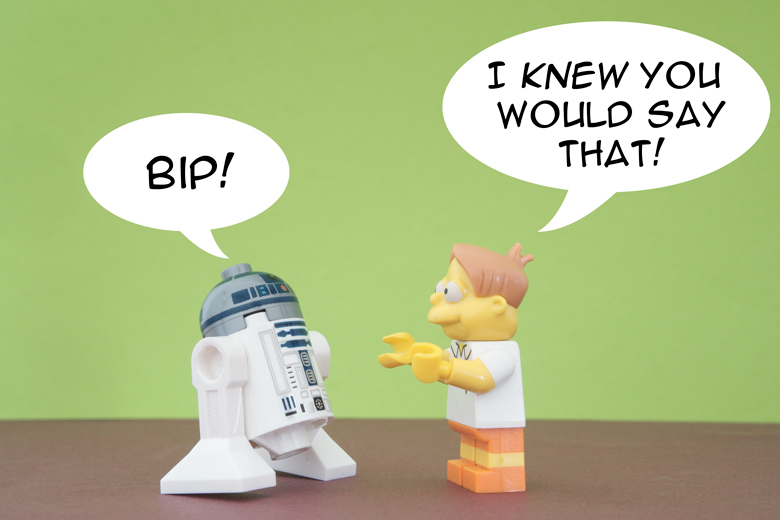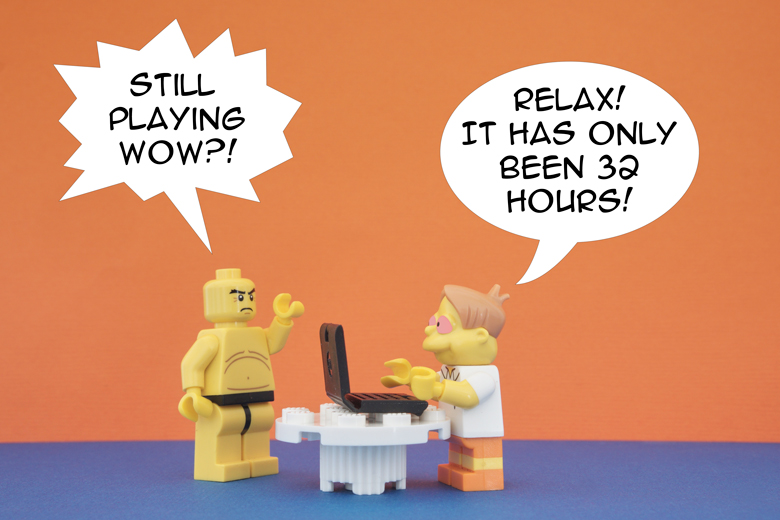
In the first article of this series about stress, I was describing one of my panic attacks when I was working at my first job as a developer, 10 years ago. I was a mess at the time: I had a stressful job and I was partying a lot to try to blow off steam. I was mainly drinking and smoking at a point where I could not even remember half of the evening.
Even if I had many friends, I was feeling very isolated at that time. One year and a half later, exhausted, unhappy, feeling deeply unsatisfied, I burned out again. Nothing was really important anymore. I used to love programming since I was a kid but, at that point, I hated it. It was only a source of distress.
I put all the fault on the software industry itself.
After taking a long break, I understood that I needed to do some profound changes in my life. Making everybody around me responsible for my condition was too easy. It wasn’t totally wrong, but it wasn’t totally right either. I knew I could be in control of some aspects of my life, and I was determined to regain that control.
I experimented with other ways to deal with my stress, trying to come back to more healthy habits. It took me many years and I failed many times but, today, I’m glad of the result. Trying to get healthy and fit changed my life, and probably saved it too. I’ve implemented very strong habits to be more effective in what I love doing. As a result I feel more energized, I have precise and strong purposes, and I feel more alive than ever. This is exactly how being happy looks like.
I would like to share what I found during these years of self-reflection concerning this very important topic: stress and anxiety. More precisely, we’ll talk about:
- The importance of social support to lower our anxiety.
- How to keep control in your work and in your life.
- How predictability can help us to decrease our stress.
- How lowering our compulsive behaviors.
- The importance of fulfilling hobbies.
As always, I don’t ask you to follow my advice blindly. You need to try them by yourself and see if it works for you.
The Best Way To Lower Your Stress: Social Support
During periods of stress, we need to rely on the others. Unfortunately, in our field, we have tendency to hide our struggles, especially mental ones. We don’t speak about it. We don’t want to feel weak, unworthy, and not in control. We pretend to ourselves, and, therefore, to the others, that everything is fine, even when it’s not.
This is a big mistake.
Chronic stress can lead you to very dark roads: more serious mental health issues like anxiety, burnout, depression, or hate of your job and everything linked to it.
Support From Your Closed Relatives
Speaking with the persons close to you about your stress will be the most effective: your partner, your family, your close friends. One of the longest study on happiness shows that mental health is strongly correlated with the people who are close to you.
Why is it good to externalize your problems by speaking about them?
- Explaining your struggle can cast a different light on them. You will see them differently if you articulate them with words.
- Other people might have dealt with the same problems and can give you precious advice.
- They won’t only live in your head anymore, but outside your brain. It makes them less abstract and, therefore, easier to think about and solve.
We often think that we’re alone with our problems. That’s not true; everybody has problems, even the ones you consider successful or better than you. We’re all human beings. We all have emotions. Don’t be ashame of them.
Speaking Out at Work
If your stress is related to your job, you need to talk about it with your colleagues and your managers as well. If you know (or feel) that your managers think a “good stress” is beneficial, remember that your health is the most important. If they don’t want to understand your struggles, try to find another job.
After the difficult start I had in the industry, I’ve never been afraid to be very transparent on these questions, especially when somebody was clearly heading to the burnout. I don’t hide anything, I speak about it loud and clear. We need to show that it’s not a taboo. Others might follow our path and finally speak about their struggles too.
These problems should not be tackled at the individual level, but at the company level. After all, if you are on the dark road of burnout, your colleague might be on the same path. It means that something is wrong in the company: it can be the company culture, the processes, or some toxic colleagues. Whatever it is, it needs to be found, addressed, and fixed.
Seeking Professional Help
Our brain is a very, very complicated organ we don’t understand and control. We don’t create consciously our problems and or our struggles, and sometimes we need to accept that we can’t solve them only by ourselves.
Our pride won’t improve our stress or our mental health. Quite the contrary.
That’s why we shouldn’t be afraid to seek help from professionals if we feel that we can’t manage our stress anymore. Better sooner than later.
Keeping Control

I’ve a quizz for you: what can be quite stressful in our daily life?
- Dinosaurs.
- Dead spirits.
- Unknowns.
You’re right! The good answer is 1. Dinosaurs 3. Unknowns. Things we don’t know are frightening and stressful. Simply because we have no knowledge or experiences about them, and, therefore, everything can happen. The best and the worst. It’s nice to survive, so our brain is still in a survival-oriented mode; as a result, the worst will often look more likely than the better.
In short, stress can kick in when we’re not in control.
It has been proven multiple times that a perception of control, that is, if you think you’re in control, can help to lower significantly our stress.
Control in Our Work
How to gain more control, or, at least, having the impress of control?
We could take more responsibilities in our daily job. Even if it can be seen as a source of stress at first, it can give us a great sense of purpose and, when we’ll begin to understand and master our new tasks, it will come with nice feelings of accomplishment too.
Try to ponder if the stress caused by more responsibilities doesn’t outweigh the stress you drop by feeling more in control. Again, since we’re all different, we need to experiment and explore by ourselves.
Also, we can try to be aware of the results of the company we’re working for. We can also ask our colleagues in other departments how they do their work. Even if we won’t control all of them, we’ll have a broader understanding on what’s going on in general. The company you work with won’t be a total dark unknown anymore, but more like a white box you can see and understand.
After all, coding means, most of the time, mapping the business domain of your company with the software we create. Beyond lowering our stress, knowing what happens in the companies we work with can make us better developers.
Control In Our Lives
One of my most controversial software opinions is that your sleep quality and stress level matter far, far more than the languages you use or the practices you follow. Nothing else comes close: not type systems, not TDD, not formal methods, not ANYTHING.
Stress can come from the company you’re working with as we saw, but it can also come from your daily life. Precisely, tiredness can increase your level of stress very quickly. After all, tiredness is a lack of control on ourselves.
It happens to me quite often: I really want to work and be productive but my mind doesn’t follow. I stay in a mental fog without being able to solve the simplest problem.
You need to be aware that trying to have a healthy life will impact your energy level and, as a result, your level of stress significantly. Here are the three Power Gem for a mindful developer:
- Your eating habits are important. Eating correctly will give you the energy (including the mental energy) you need. More on that below.
- You need to sleep enough and well. There is no magical recipes here: you need to know how much time of sleep you need in order to feel rested and energized. In average, an adult needs 7 to 8 hours of sleep per day.
- Doing some physical exercises, on a regular basics, is essential. It could be as simple as some body weight exercises every evening for 10 minutes. It could be walking a bit more, climbing, or swimming.
I went from the very unhealthy to the very healthy and there is a world between the two. No, there are ten of them. More energy will bring you an insane amount of control on yourself. Again, you need to explore what works for you.
You Can’t Control Everything: Mindfulness and Meditation
We need to know what we can control and what we can’t. Spotting and accepting the uncontrollable sides of our lives is important too.
Trying to work on ourselves, day after day, to accept and let go what we can’t control is a real challenge. If you know that you can’t have any power on some aspect of your job or on some external actors, stressing about it won’t change anything.
It’s easy to say but hard to do. It’s not easy to control our stress.
The best exercise I know about accepting the uncontrollable is awareness and, more precisely, meditation. Awareness? Meditation? Welcome to the buzzword fest!
But there are good reasons why everybody speaks about mindfulness. It has been very powerful for me to learn how to accept and let go what I can’t control, especially regarding my own thoughts.
Meditation is not attached to any religion or faith: at its core, it’s a pure mental exercise. I consider it as a workout for my brain, a very beneficial one on top. I meditate daily for more than three years now:
- I began by 5 minutes every morning.
- When I felt comfortable, I increased to 10 min.
- At the date of this writing (2021), I meditate 30 minutes per day, sometimes more.
Using a timer can help you create some boundaries to your practice. It helped me to create the most beneficial habit I have.
There is no immediate goal in meditation. You can’t be “good” or “bad” at it. The most important is doing it consistently. Here’s a very good and simple resource I really like.
What are the benefits?
- You’ll be able to be a witness of your own thoughts and your emotions.
- You’ll be able to anticipate your mood before it takes control of your brain. The key is to accept these emotions and let them go.
- You will understand the bizarre reality that emotions and thoughts are not you.
- It will increase your overall focus.
- It will teach relax you when you’re used doing it.
It’s better to meditate a few minutes per day if you’re doing it consistently every day, than meditating 30 minutes every month. It’s a hard exercise, so it’s important to move forward with small steps.
I won’t make you a superhero. It might not improve anything for quite some time. Patience, as often, is key here.
Stress and Predictability

As we saw above, the unknown is stressful because we can’t control it. We can’t anticipate it, either. Predictable situations are, by definition, easy to anticipate.
Predictability in Our Job
Consistency is the best friend of predictability. If the culture of the company you work for is consistent, you’ll know what you can do, what you can’t, and what consequences will have your actions. You’ll know that everybody at your level must follow the same rules and, as a consequence, everybody will be equal. This is very good for a balanced company culture.
Conversely, if your management seems to act randomly, if your company has no rule and everybody is not really sure what they can do and what they can’t, it will be problematic. If some people allow themselves more rights than others, you can expect a higher level of stress, doubts, and jealousy. An explosive mix.
If your company lacks some consistency, try to explain to your managers the benefits of knowing what can happen, what is allowed, and what’s not. These rules need to be written somewhere, to prevent everybody to forget them, intentionally or not.
You don’t want to go to work without knowing a minimum what your day will be made of. If it’s always for the best, it shouldn’t be a problem; but my experience showed me that it can be for the worst too.
That’s why you should choose wisely the companies you work for.
Habits and Predictability
Our habits are the keys to have a consistent life. Even if we don’t necessarily realize it, we are mainly our habits, that is, we do mainly the same things every day, automatically. These automated actions save you a lot of energy: your brain don’t have to make any decision or any thinking.
Building and maintaining the habits you want to have will show you how to live your life deliberately. To me, this is the true freedom everybody seems to seek. The problem with habits: they can play against you. Many people out there try to design applications and create some “truth” to push us into habits we don’t necessarily want to have, using ingenious and manipulative techniques. We need to regain control of our lives.
I won’t go into habit building here, it’s not the subject. In that regard, I would recommend the book The Willpower Instinct. It’s a pretty short and practical read how to build willpower. It has less fluff than many other “auto-proclaimed self-help books”, and can teach you a tonne about habits.
You might think that doing the same habits every day sounds very boring. It can be if it’s pushed too far: we need some unexpected events in our lives. It’s nice to have a balance. Again, exploring what habits would work for you and your goals, looking at what they bring to you adjusting them as you go is key here. An iterative, step-by-step approach can work for many things.
This will improve the predictability in your life and relieve a lot of stress.
Ditching your Compulsive Behaviors

Some compulsive behaviors are believed to decrease stress but my experience show me exactly the contrary. It’s not only my experience: the Mighty Science show the same.
What do I mean by compulsive behaviors?
- Any sort of drugs, prohibited or legal, like alcohol, tobacco, cannabis, or even refined sugar.
- Behaviors which are difficult to change like gambling, addiction to food, or to shopping. It can be anything and everything, depending mainly on our personalities.
Personally, I smoked for more than 10 years, drank alcohol at least once a week pretty heavily, and I was addicted to sugar (this study shows that it’s as addictive as cocaine). I could not eat one cookie without eating the whole package and the second one too.
I tried to discard all of these behaviors from my life, one by one, step by step. The conclusion?
- Even if drinking can relieve stress on the short term, it increases my stress level on the middle and the long term. How? Alcohol makes me very tired and very anxious after a while. Tiredness increase your stress level drastically. More I consume alcohol, worse it is, but I noticed the same pattern with only two biers a week.
- It’s known that alcohol act pretty badly on our prefrontal cortex, the part of the brain which allows us to have willpower and self-control.
- Smoking cigarettes was decreasing my energy, making me tired and stressed.
Here are some questions you can ask yourself to get rid of these destructive behaviors:
- How many times do you watch your phone per day? Does it help you in any way? Would you like to do something else instead?
- Consumerism (buying stuff) is presented to us as the solution to every single of our problems. Look at your orders on Amazon: how much do you buy there? Do you really need everything you buy? Do you use it? Do you try to buy your way to happiness? Is there any other problem in your life you try to hide with these things?
- Food habits can be very strong. For how long do you have the same food habits? Did you try to change it, by curiosity, to see the possible positive effects?
- Does this habit contribute to my bad mood? Why am I angry sometimes? Is it linked to something I’m doing day after day?
In short:
- Some of our compulsive behaviors influence our moods and our energy level.
- Our level of energy influence our level of stress.
- Tiredness brings stress, even if we might not perceive it fully. It’s heavily influenced by our behavior, our environment, and what we consume.
What I encourage you to do: trying to look at your habits in your everyday life. Try to modify them slightly and see the effects on your mood and on your stress level.
If you want to get rid of some of your compulsive behaviors, you need a lot of patience and resilience.
Finding Fulfilling Hobbies
It’s important to have other hobbies than coding outside our job. Something fulifilling and relaxing.
I love photography for example: it gives me a totally different sense of accomplishment when I take pictures I like. It pushes me to go outside and experience the world differently.
I also believe that these hobbies can help you to be a better developer, by bringing you some unique concepts and point of view. Mixing interests and learning from one area to apply the new knowledge to another can create unique ideas and innovations.
A last point concerning hobbies: try to avoid putting too much stress on yourself about your work or your hobbies. Enjoying the process rather than the result is really important in order to relax.
Journaling to Relieve Stress

Writing about our thoughts and emotions can relieve stress and improve our mood. I would recommend writing bullet-point journaling. It’s an easy way to write the essential without losing yourself into the labyrinth of verbosity. It’s also easier to read afterward.
As an example:
What did I accomplish today?
* Saving the world from an alien attack.
* Going out with the dog.
* Used a fork for dinner.
You can write about everything you feel like. Here are some ideas:
A Journal About Your Feelings
Externalizing your emotions by writing them down can have a real impact. It’s then easier to understand them, thinking about them, and accept them.
You can focus on your positive feelings to give you some motivation and to show to yourself that your life has awesome moments. You can take a more realistic approach by writing the positive and the negative emotions you had throughout the day, how you reacted to them, and even some ideas to improve your life.
Don’t forget that we’ve tendency to see the negative more than the positive. You should make an extra effort to be as honest as possible about the state of mind you had during the last days, the last weeks, or the last months, depending on the frequency of your writing.
A Journal About Your Job
You can also write in your journal the successes you had at work, even if it was “only” a bug fix or a good advice given to a nice colleague. These little things add up overtime and help the company you work with to move forward. You should be proud of every little victories you had.
Writing the mental process you went through to solve a particular problem can be also valuable. It can be useful if you stumble later into a similar problem. It comes back to increase your control on your life. After all, knowing that you have your own personal bag of solutions is reassuring.
You can write the ideas you had, how you communicated them, and how your colleagues or your management reacted to them. After a while, you might recognize patterns to see what works and what doesn’t. It will increase your confidence and your value.
A Journal About Your Decision Process
It can be also useful to know why you took X or Y decision at a precise point in time, to understand where you are today, and why.
Again, you might lower the unknown surrounding your life by understanding how you took your decisions, why you took them, and why they had these consequences.
Writing this kind of journal is even more valuable for the important decisions which have an impact on the long term. You can track the progression of that impact, see if what you wanted really happened, and the unexpected problems popping up along the way.
Changing Your Life to Lower Your Stress
Since we can be stressed without even knowing it, considering it as a “normal state”, it’s important to try to experiment on our lives by changing part of it, especially the parts which are likely to be the source of this stress.
To summarize what we learned together:
- Social support is the most important and effective way to manage and lower our stress. Don’t hesitate to speak about your feelings and your doubts.
- Having an impression of control in our lives (at work and outside) can lower this dreadful feeling of unknown.
- Predictability at work and our your personal lives can have a positive effect on our stress level. It means being as consistent as we can and trying to build the habits helping us to chase our higher purposes.
- Patiently trying to avoid the behaviors bringing negativity to our daily lives is key.
- Taking enough breaks from everything related to our work and having creative hobbies can lower our stress. It will only work if our expectations are low enough.
- Writing a journal, on a consistent basis, can help us to deal with our stress, bringing more control in our work and in our lives.
Lowering our chronic stress and, as a result, increasing our happiness will make us more motivated and more productive. It will definitely increase our value as developers and as human beings.